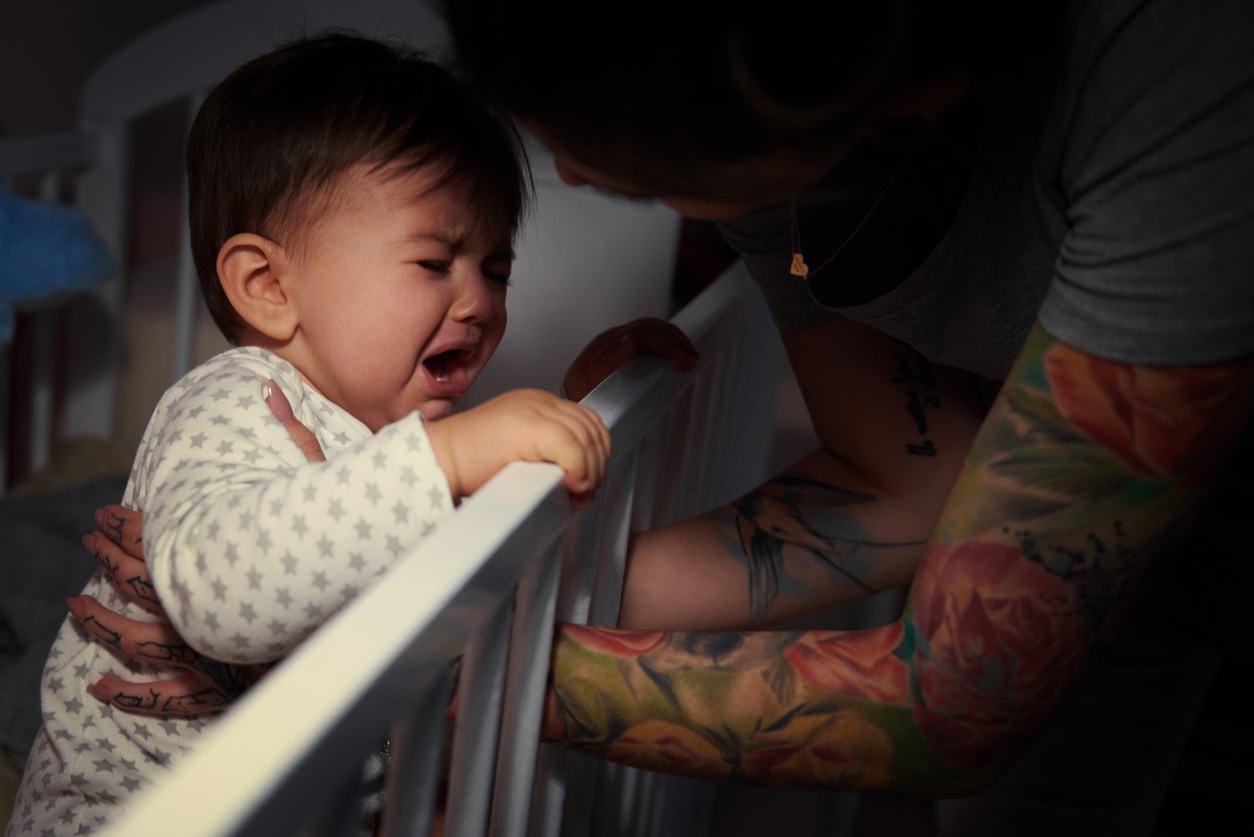
Why is it that when a baby cries everyone acts like it's out of the ordinary? It's not! It's actually completely and totally normal for babies to cry because that's how they communicate any number of things. The truth is that it's normal for newborns to cry anywhere from two to three hours in a 24-hour period. The thing is that if your baby is crying that much, it feels like a lot longer and you want to do anything you can to calm your baby down.
More from MamásLatinas: Adorable photos of babies dressed as burritos
OK, now that we're all squared away on the whole babies crying is a normal thing, it's also normal to want to figure out why your baby is crying so you can do something to help your baby stop crying. There are many reasons why your baby might be crying and you'll get better and better at recognizing those reasons. Still, sometimes when your baby is wailing, it can feel overwhelming, so let's go through some of the most common reasons why babies cry, ways you can soothe your baby, and when you should reach out to your pediatrician.
Why does a baby cry?

Well, to begin with, crying is one of the only ways that babies have of communicating their needs. It's not like they can open their mouths and say, "Hey, how about you give me a burp," so instead they cry. Also, it's normal for babies to cry as much as two or more hours a day. So the main reasons why a baby cries may be:
- Hungry
- Sleepy
- May be too cold or too hot
- Needs affection, attachment, or protection from mom or dad
- His diaper is dirty
- Infant colic or gases
- Is bored
- May have fever or pain
Did you check if the baby is hungry?

Yes, we know this one is basic, but it's best to start with the basics. Newborns nurse or bottle feed somewhere around eight to 12 times a day. That means that they need to eat every few hours. It never hurts to see if feeding baby will stop the crying.
Could it be gas?

Gas or colic are really uncomfortable and maybe even a bit painful for babies. Keep in mind that since they eat every few hours and their meals are all liquid, they can get a bunch of air trapped in their tiny bellies. Make sure you are patting baby softly on the back after each feeding to help him burp up any trapped gas.
There’s always a chance the diaper is dirty.

You may have just changed baby's diaper less than an hour ago, but babies can have more than six wet diapers a day. Sitting in a wet or dirty diaper is no fun and would even bring an adult to tears. Check the baby's diaper to make sure it's clean and dry.
Is it nap time?

Newborn babies sleep a lot. If they don't get 14 to 17 hours of sleep a day, they are going to be fussy and cry. Of course, they don't sleep that much at once, which means that it needs to be broken down into naps of two to four hours at a time plus the sleep they get at night. If you've checked for hunger, gas, or a dirty diaper and you keep wondering why your baby is crying for no reason, it may be time for a nap.
Your baby might be too hot or too cold.

Depending on the temperature and what your baby is wearing, she might be too hot or too cold. If you don't know how to make a baby stop crying, try removing a layer to help her cool down or add a layer to help her warm up. Give your baby a moment to adjust while you soothe her to see if she calms down before trying something else.
Your baby might be overstimulated.

Imagine going from a dark, quiet womb to a bright, noisy home. It's a big change and can be overwhelming for some babies. Try turning off all the lights in a room and closing the curtains. If your home is on the noisier side, you can also use white noise to help baby not be jarred by sharp and sudden noises. Just make sure not to turn the white noise up too loud because it can damage a baby's hearing.
Sometimes babies get lonely.

Babies like to be held and sometimes when they get lonely, they start crying so that you will come and be with them. It can be frustrating at times, but remind yourself that this time will not last forever. Hold your baby close to you and give him some gentle pats on the back to calm him and help the loneliness go away.
Have you tried swaddling?
Some fussy babies calm right down when they are swaddled, which is a special way of wrapping a baby in a blanket. It's almost like it makes them feel hugged. If you're not sure how to swaddle your baby, ask your pediatrician or other health care provider. It's not hard, it just takes a little practice.
Guess what? Babies get bored.

Your perfectly fed, burped, rested, and clean diapered baby might be crying because he is bored. He might just need a change of scenery, so to make a baby stop crying try taking him outside for a walk or even just into another room that looks different from the one he's in.
Sing to your baby.

Singing is a great way to help a baby stop crying. It gives her something to focus on. The best part is that you don't even have to be a good singer for a little one to enjoy the sound of your voice. Your baby is born loving the sound of your voice. Pick a song that you find soothing so that you can both calm down.
Have you checked the baby’s temperature?

Fevers in newborns can be dangerous. "Call, your baby's healthcare provider immediately if your baby is younger than 3 months old and has a rectal temperature or forehead (temporal artery) of 100.4°F (38°C) or higher," advises Stanford Children's Health. If your baby is 3 to 6 months old and has a temperature of 102°F or higher, contact your doctor. If your baby is 6 to 24 months old and has temperature higher than 102°F for over 24 hours, contact your doctor.
Is it OK to let a baby cry?

What if you've done everything you can to soothe your healthy baby and he still won't stop crying? Is it OK to just let him cry? Here's what the Mayo Clinic says: "If your baby doesn't appear sick, you've tried everything, and he or she is still upset, it's OK to let your baby cry. If you need to distract yourself for a few minutes, place your baby safely in the crib and make a cup of tea or call a friend."
Why does my baby cry for no reason?

Sometimes, no matter how hard we try, we just can't figure out why our baby is crying. If you're worried about it, don't be afraid to reach out to your pediatrician. If your baby is crying more than three hours a day, she might have colic or the excessive crying could be an indication that something else is wrong. Don't panic, just reach out to your pediatrician.
Take care of yourself, too.

A crying baby can be incredibly stressful and trying to calm a baby when you are stressed is almost impossible. Take a little break to calm yourself down, if you need to. Focus on your breath and remind yourself that you are doing the best you can. Return to your baby in a calmer state and if sitting in a rocking chair while holding your baby and listening to music you like helps you stay calm, then do that.

